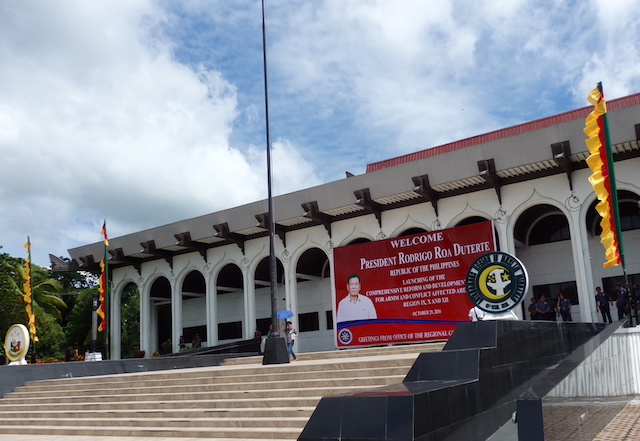COTABATO CITY (MindaNews/03 Nov) — When President Rodrigo Duterte took the stage at the Shariff Kabunsuan Cultural Complex in Cotabato City last weekend, he was a picture of a triumphant leader returning to a people who have been deprived of their fair share in development by outsiders who ruled over them for centuries, some of whom were hostile and aggressive.
The crowd’s mood was not of fanfare but of familiarity, with people excited by what the first president from Mindanao would say. There was an air of assurance and affirmation as one of their own now occupies the country’s seat of power in the far north. For many these are days of optimism, as the promise of change comes and the end of decades of armed struggle is in sight.

Duterte claims he has Moro blood from his mother Soledad Roa’s Maranao lineage. Further boosting his closeness to the Bangsamoro is having grandchildren who are Muslims, fathered by his eldest son who is married to a Tausug.
Without the cuss words he usually utters in his speeches, the President was respectful in communicating to his Moro audience. It also helps that God, he claimed, recently ordered him to stop using foul language.
But then he also knows that Muslims are not used to profanities in making a point during conversations.
His first official visit to the seat of the Autonomous Region in Muslim Mindanao (ARMM) last weekend is a breakthrough in itself, in a territory whose leaders and residents often feel neglected by the central government.
Duterte thus made initial moves to correct some of the injustices the Moros have suffered from. First is the fight to reduce poverty and end hunger and malnutrition, supported by the national government’s resources and guaranteed to have his personal attention – a response to the wishes of the region’s poorest of the poor.
Among the priorities in his Comprehensive Reform and Development Agenda for the ARMM is providing access to production tools and the needed electricity in the agriculture and fisheries sector, to social and health services, and to skills training and employment. Other areas in Mindanao where development has been stalled by armed conflict also stand to benefit from his administration’s said agenda.
Prior to the president’s arrival, Judy Taguiwalo, Social Welfare and Development Secretary, noted that statistics that place ARMM on top of malnutrition and poverty lists among the country’s regions made the President uneasy during a cabinet meeting during the first few days of his term.
Assistance for conflict-affected regions will also come from other sources apart from the central government. Talks of a new deal with a Japanese supermarket chain that wants to source its bananas especially from conflict-affected areas in Mindanao is just the start of an expected trend wherein Bangsamoro areas would be prime real estate in terms of private investments in the near future.
Even in years past, when the President was still mayor of Davao City, he has already expressed his desire for the Bangsamoro areas to move forward, not just to have peace but to attain sustainable development at pace with its neighbors — perhaps at a growth level that could compete with the island’s high-income regions such as Davao and Northern Mindanao.
After all, he would then explain, the agro-climatic resources of the Moro provinces are no different from Mindanao’s more progressive regions. That is part of the reason why investments in agribusiness plantations have spilled over to ARMM provinces and other neighboring regions in recent years, notwithstanding threats from armed conflict.
Official Development Assistance from foreign agencies is expected to come in as well. Since President Duterte could steer where development funds should go – in both sectoral use and location – priority areas are expected to be those lagging behind in socio-economic development.
Security is a critical variable, however, and efforts on this concern should be exerted not just by the national government but by the Bangsamoro leaders as well. The first crucial steps, of course, were already taken by the previous administrations. This was followed by the reinforcement of established relationships, as trust and goodwill have been expressed by the Duterte administration as soon as it started four months ago.
With vastly improved peace and order, having adequate resources – or at least gaining the desired development momentum – in the next few years would have a direct impact on the desire of the President to shift to a federal form of government. Under this system, states that were once separate regions would have more autonomy and empowered local government units that have the potential to steer our country along the promised path of prosperity.
(MindaViews is the opinion section of MindaNews. Amir Mawallil is the executive director of the ARMM Bureau of Public Information)







